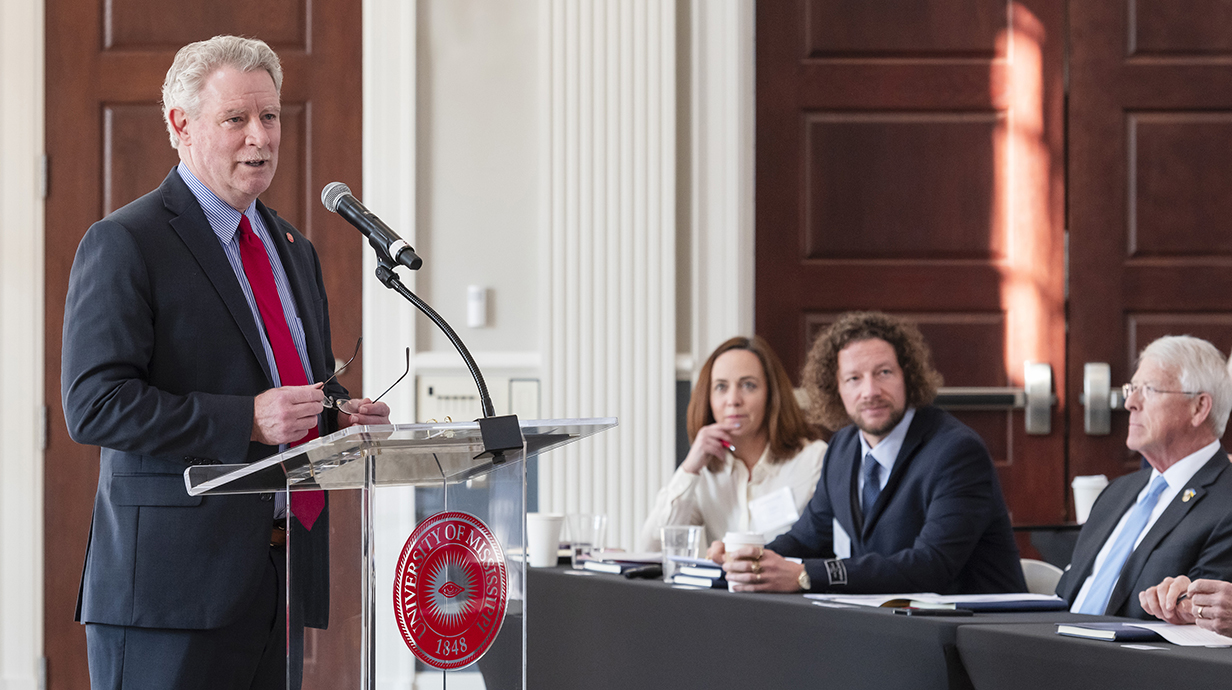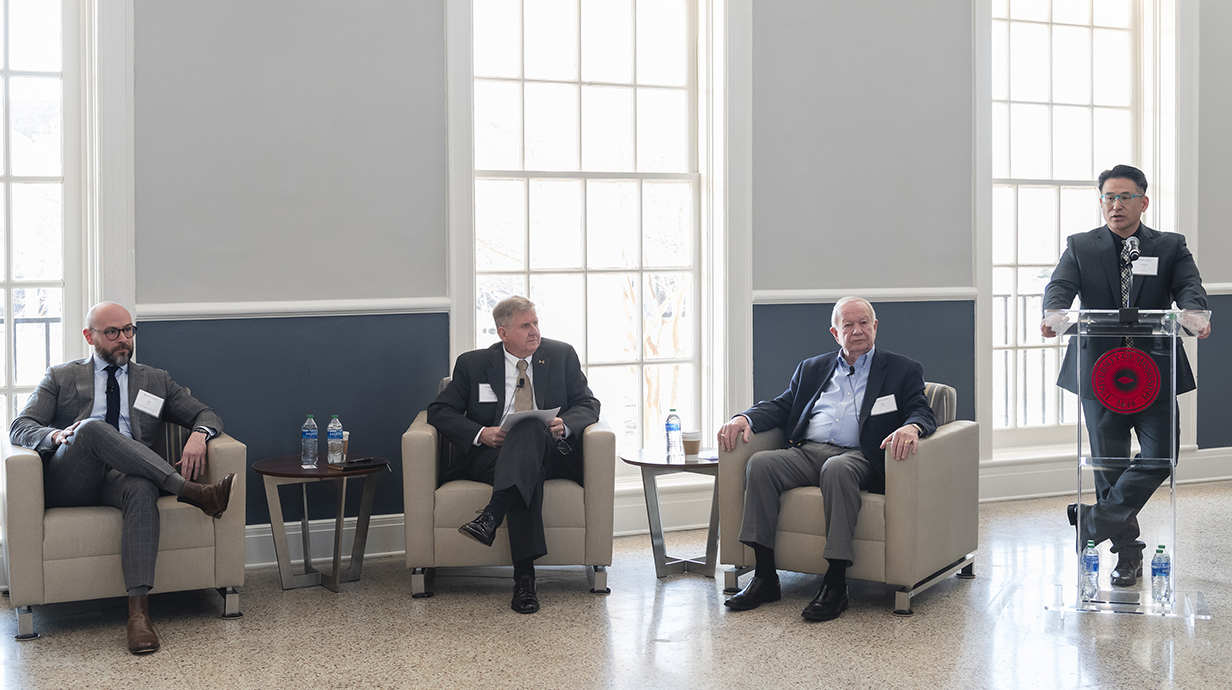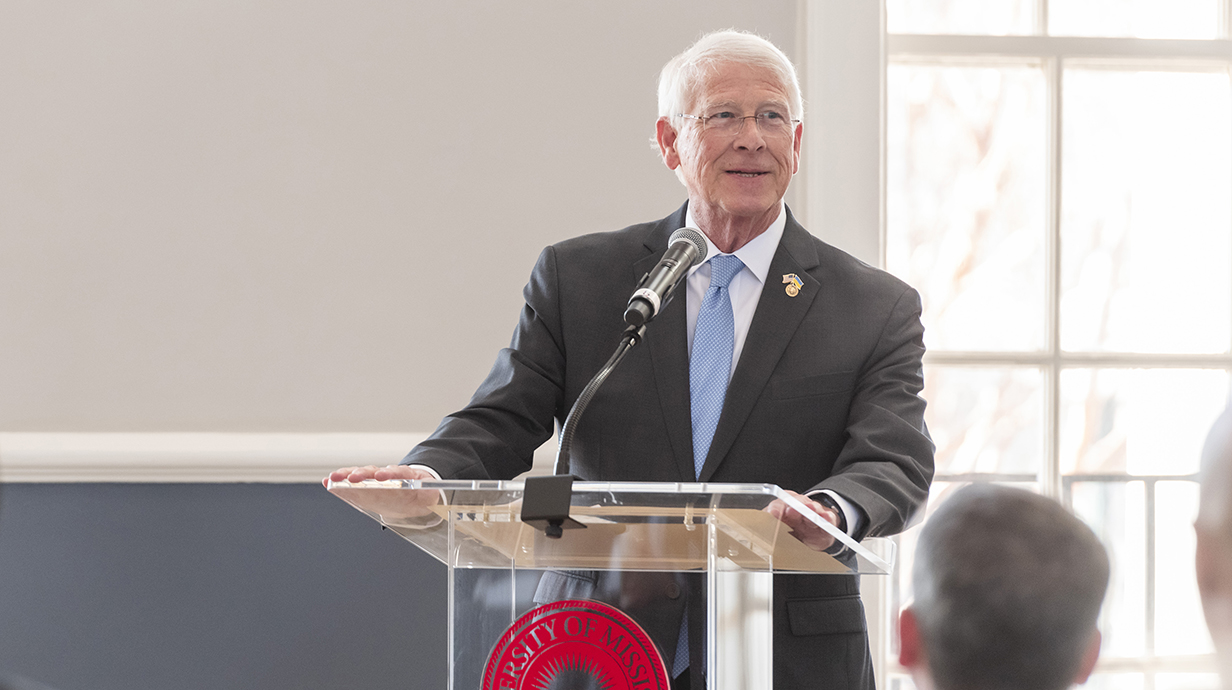Narrative Intelligence to Fill 'Critical Hole' In National Security
Summit gathers leaders in business, politics, military to talk about online narratives

OXFORD, Miss. – Narratives shape perspectives of the world, from posts on social media to television, blogs and digital signage. To harness and understand those narratives, the next generation of the workforce must understand narrative intelligence.
That's the message national leaders in politics, business and the military shared Tuesday (Feb. 20) at the inaugural National Security Summit hosted by the National Center for Narrative Intelligence at the University of Mississippi.
"We want to be the champions of (narrative intelligence), and we think this could be something our state is very proud of," Chancellor Glenn Boyce said. "We intend to be at the forefront of it here in Oxford by serving as the home for this vital initiative."
Narrative intelligence is an artificial intelligence- and human-driven process that gathers and analyzes enormous amounts of data from across the internet to detect trends. It is particularly useful in identifying misinformation and disinformation, making it an asset for national security, as well as business.

Doowan Lee (right), adviser and national security expert at EdgeTheory, moderates a panel with (from left) Zachary Tyson Brown, national security expert at The Aerospace Corp.; Lt. Gen. Charles Cleveland, former U.S. Army Special Operations Command commander; and William P. Crowell, former deputy director of the National Security Agency, during the National Security Summit. Photo by Srijita Chattopadhyay/Ole Miss Digital Imaging Services
"We are entering a phase in our history in which the amount of info is not only growing, but the amount of information that is not real is growing by leaps and bounds," said William Crowell, former deputy director of the National Security Agency. "In light of this growth, the big demand that we will have in the future is for the tools to not only cope with the amount of information, but the kind of information we have.
"We need tools to examine narratives to find out where they come from, what their purpose is and whether they are based on real facts or if they've been made up. That's what this summit is all about."
The National Center for Narrative Intelligence aims to teach students and companies the importance of narratives and research new techniques and applications on how to use narrative intelligence to understand and change perspectives, said Wes Jennings, chair of the Department of Criminal Justice and Legal Studies.
Jennings and Andrea Hickerson, dean of the School of Journalism and New Media, are co-directors of the center, which launched in the fall of 2023 as the first of its kind in the country.
"We need to develop people in all different sectors that can join together to advance education and research around narrative intelligence," Jennings said. "The next generation of the workforce in any of your industries needs to be aware of narrative intelligence."
The amount of information on the internet grows by approximately 2.5 quintillion bytes per day – far more than any human can consume, said Joe Stradinger, CEO and founder of the company EdgeTheory, who spearheaded the idea for the center. In all those bytes arise narratives, he said.
"Just like the rise and fall of stocks causes changes in markets, the rise and fall of narratives cause death, cause warfare, etc.," Stradinger said. "When you study publicly available information – using narrative intelligence – you're able to tell who's behind the narrative and what is the intended impact."

U.S. Sen. Roger Wicker discusses the need to combat misinformation and disinformation at the National Security Summit. Photo by Srijita Chattopadhyay/Ole Miss Digital Imaging Services
The timing of the center and the summit could not be better, U.S. Sen. Roger Wicker said. As America contends with rising tensions with Russia, China and others, global threats – including disinformation – grow exponentially by the day, he said.
"Why am I so glad we're doing this? Because we're not where we need to be," Wicker said. "It's a dangerous time, but don't take my word for it.
"Admirals and generals and secretaries past and present have come to see me as the ranking member of the (Senate Armed Services) Committee and say this is the most dangerous situation we've had since World War II."
The use of misinformation – unintentionally false information – and disinformation – propaganda or lies designed to change a person's opinion or understanding of an issue – in warfare is not new, said Doowan Lee, adviser and national security expert at EdgeTheory.
The difference between the propaganda of the past and the disinformation of today is the reach and potential impact of the internet, he said.
"I would say we are in a hot conflict in the information domain, the human domain and the cyber domain," Lee said. "This is not a new form of warfare. This is literally the most persistent and present threat we're facing every day."
Outside of identifying disinformation, narrative intelligence can also provide crucial information to the military, said Lt. Gen. Charles Cleveland, former United States Army Special Operations Command commander and senior adviser to the Army.
"We should be doing everything we can to get good at the kind of war we ask our young people to execute on behalf of this nation," Cleveland said. "This center has a chance to fill a critical hole in our national security."
By
Clara Turnage
Campus
Published
February 23, 2024
